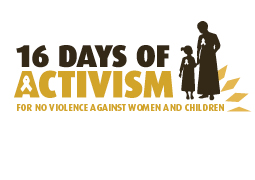
The effectiveness of awareness campaigns aimed at fighting gender-based violence, such as the 16 days of Activism for no violence against women and children, came under scrutiny in the National Assembly during a debate on the topic: “Building safer communities and realising gender equality through socio-economic empowerment of women and youth in the year of Charlotte Maxeke”.
Opening the debate, the Minister of Social Development Ms Lindiwe Zulu said the government remains committed to building safer communities, so that women and children can live without fear, panic or distrust that they may be the target of violence. “Year-by-year, we come to this honourable house to repeat almost one and the same thing with the hope that the nation will finally hear the cries of women and children who find themselves under these difficult conditions of gender-based violence (GBV).”
She said cabinet adopted a National Strategic Plan on GBV and femicide in response to the violence against women and the LGBTQI community. “We are on a journey to change the fortunes of the people of South Africa, in particular to focus on the issues which remain a pain to our society. Let us do everything we can to stop GBV. Parliament must hold government accountable on the programmes that they said they will implement,” Minister Zulu said.
Democratic Alliance Member of Parliament Ms Nazely Sharif said the fight against GBV in South Africa government must take responsibility an admit its failures. “If government cared, we would be able to see progress. It is all good to have a plan, but if not actioned it means nothing, theories mean nothing. We need to stop with the rhetoric and start acting,” she said.
The Economic Freedom Fighters’ Ms Omphile Maotwe accuse the country’s criminal justice system of failing women by “giving a slap on the wrist” to perpetrators of gender-based violence. “The 16 Days of Activism is just a box-ticking exercise. It offers no reprieve to victims of abuse and violence. GBV is a societal problem and not a policy issue. We need to address poverty, housing challenges, get our policing in order, get enough trained officers who can handle GBV cases and deal with the disorder at the forensic laboratory,” she said.
Inkatha Freedom Party (IFP) MP Ms Duduzile Hlengwa added her voice to the call for more government action to ensure safer communities for women and children. Ms Hlengwa also moved for additional protection for women working in the frontline in healthcare, who were exposed to the Covid-19 pandemic.
Tamarin Breedt of the Freedom Front Plus said: “We have debated GBV more than 12 times and still no tangible solution. Instead sexual offences are increasing. Statistics show South Africa is a very violent country. There is no tangible difference since the inception of the 16 Days campaign. We are frustrated by the lack of change.”
She also called for adequate resourcing of the South African Police Service, and added that the dysfunctional forensic laboratory was a disgrace to the fight against GBV and femicide.
Marie Sukers of the African Christian Democratic Party called on Members of Parliament to unite beyond party lines in the fight against GBV. “Children are exposed to trauma from the womb to the grave. Young girls are exploited by older men for through sex for gifts because of poverty. We need a united approach to tackle this problem,” said Ms Sukers.
Mr Nqabayomzi Kwankwa also raised a concern that GBV continues to be very prevalent and evasive in South Africa, 20 years after the launch of the 16 Days campaign. “The 16 Days campaign and others, while they are great initiatives to curb the problem, they are not enough. The capacity of law enforcement must be reinforced to be able to investigate and prosecute GBV crimes,” suggested Mr Kwankwa.
The African Transformation Movement (ATM) proposed the retraining of police to deal with GBV cases and for all government departments to ring fence budgets for GBV. “We are dealing with a massive problem of GBV. More intensive efforts are needed with the scourge,” said ATM Member of Parliament Ms Thandiswa Marawu.
Mr Shaun August of the Good Party said the continued escalation in GBV is evidence that the 16 Days of Activism campaign was not a vaccine and more drastic efforts were needed to tackle the scourge. “We have the 16 Days campaign every year, but still no sign of impact. We call on government to recognize as a serious matter and expedite response, there is no easy way to eradicate it but it is important to strengthen existing interventions,” said Mr Mzwakhe Sibisi of the National Freedom Party (NFP).
Mr Willie Madisha of the Congress of the People (Cope) blamed to problem of GBV on poverty. “We have had this debate 27 times, for as long as South Africa faces the presence of poverty this debate shall take us nowhere,” he added.
The Pan African Congress (PAC) believes BV should be declared a national disaster, and that a national summit must be called to take drastic action. “Despite campaigns and awareness programmes, the problem continues to exist and it is worrisome when our criminal justice system cannot protect victims of GBV,” said Mr Mzwanele Nyhontso of the PAC.
Sakhile Mokoena
3 December 2021

